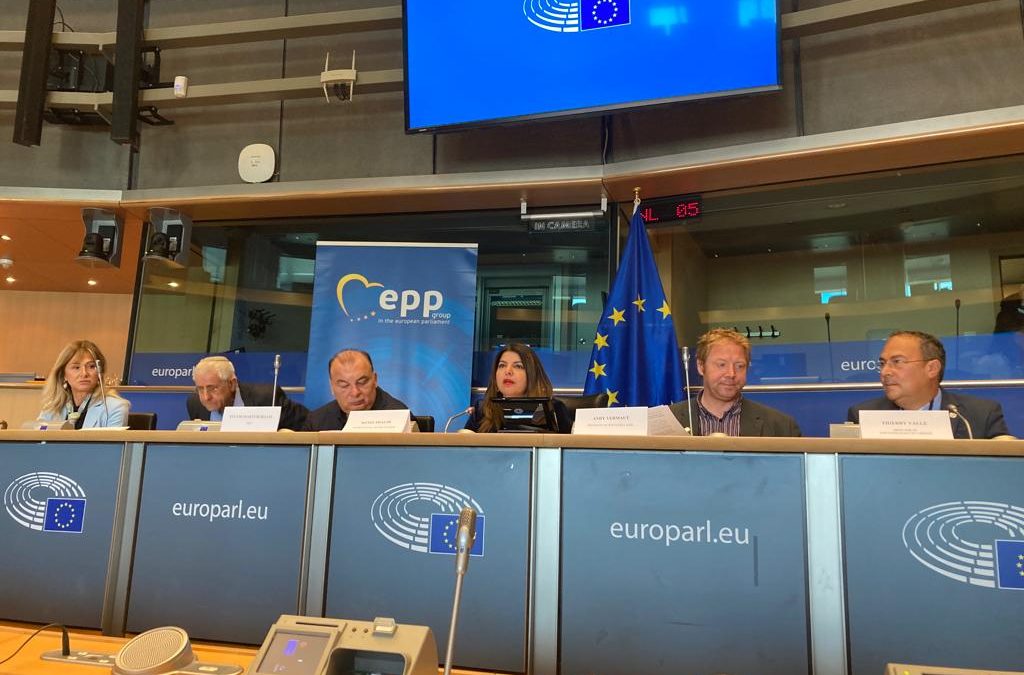By Thierry Valle
The Azeris are one of the largest ethnic minorities in Iran. They primarily reside in the northwest region of the country, which is known as Iranian Azerbaijan or East Azerbaijan Province.
They are of Turkic origin and share cultural and linguistic ties with the Azeri people in neighboring Azerbaijan.
The Azeris in Iran have a distinct identity and cultural heritage. While the Azeris have a significant presence in Iran, they have also experienced socio-political challenges and tensions.
The distinguished speakers here today will explain in greater depth the ins and outs of the situation of the Azeri minority in Iran.
As a specialist in religious minorities, I would like to give a general overview of the issue of religious minorities in Iran.
The Constitution of the Islamic Republic of Iran recognizes Islam as the official state religion and mandates that the country be governed based on Islamic law (Sharia). While the constitution grants some protections to recognized religious minorities, it also imposes limitations on religious practices and expression.
The largest religious minority in Iran is the Shia Muslim community, which constitutes majority of the population.
Other recognized religious minorities include Christians, Jews, and Zoroastrians.
These minority groups are afforded certain rights and protections under the Iranian constitution, such as the freedom to practice their religious rituals and elect their own representatives in the parliament.
However, there have been numerous reports of limitations and restrictions on religious freedom in Iran, particularly for religious groups that are not officially recognized.
Religious minorities face limitations on their religious practices and freedom of expression. Conversion from Islam to another religion is also restricted, and individuals who convert will face severe legal consequences.
Freedom of expression, including religious expression, is also curtailed in Iran. The government maintains control over religious institutions and closely monitors religious activities.
Critical or dissenting religious voices that challenge the official state interpretation of Islam can face repression, censorship, or imprisonment.
Iran is notorious regarding religious persecution, particularly towards religious minorities and those who deviate from the official state interpretation of Islam.
Those who question or challenge the official interpretation of Islam can face persecution, imprisonment, or even death with the infamous anti-blasphemy law.
Muslim religious minorities, such as Sunni Muslims have faced discrimination and limitations on their religious practices. They often encounter challenges in building and operating their mosques and face societal prejudice.
Religious minorities such as Christians, particularly converts from Islam, also face challenges. There have been a lot of reports of surveillance, arrests, and harassment of Christians, as well as restrictions on their religious activities, including church closures. Similarly, the small Jewish community in Iran has faced restrictions and occasional instances of harassment.
The Baha’i community is a primary target of religious persecution in Iran. Baha’is are viewed as heretics and face systematic discrimination and persecution.
Since the Islamic Revolution of 1979, the Iranian authorities have targeted Baha’is through various means, including harassment, arbitrary arrests, imprisonment, and even executions. Baha’i religious institutions and community properties have been confiscated, and Baha’i cemeteries have been desecrated. Baha’is have been denied access to higher education and job opportunities, leading to economic and social marginalization.
One of the most egregious aspects of the persecution is the denial of basic civil rights to Baha’is. They are prohibited from practicing their faith openly and face restrictions on gathering for worship, organizing community activities, or maintaining administrative institutions. Baha’is are not recognized as an official religious minority in Iran, and their marriages and divorces are not recognized by the government.
The Iranian government has also disseminated anti-Baha’i propaganda, portraying Baha’is as agents of foreign powers and enemies of the state.
This has contributed to a hostile environment for Baha’is, leading to social discrimination, harassment, and acts of violence by extremist groups.
This last 18 of June, I attended a conference here in Brussels to commemorate the 40th anniversary of the execution of 10 Baha’i women in Shiraz.
On 18 of June 1983, 10 Baha’i women were executed because they believed in a faith that promotes gender equality, unity, justice and truthfulness.
The women were hanged one by one, in the dead of night, each forced to witness the next woman’s death in a harrowing attempt to coerce them into renouncing their beliefs. None did so.
One was only 17; most were in their 20s.
Their families were not even notified of their deaths, their bodies were not returned to their families, and they did not receive dignified burials with religious rites.
It is believed that they were buried in the Baha’i cemetery in Shiraz by the authorities, which was later demolished and made into a “cultural and sports building” in 2014.
It is unacceptable that today the situation of the Bahais in Iran has remained the same and that this community is still subject to extreme persecution.
It is why the Baha’i International Community is launching a global campaign, called “OurStoryIsOne”, to honor the executed women and the long struggle for gender equality lived by women of all faiths and backgrounds in Iran for many decades.
Among the religious minorities that are severely persecuted in Iran, there is the Ahmadi Religion of Peace and Light community, whose concerns I will be raising today:
Members of the Ahmadi Religion of Peace and Light in Iran endure severe state-sponsored religious persecution.
They are unable to freely practice their faith and live in constant fear for their safety and lives. The Iranian authorities label them as “heretics” and “infidels,” branding their religion as a “misguided movement” and “hostile and deviant group.”
The Ahmadi Religion of Peace and Light has also faced vilification due to its accepting stance towards LGBT members and its belief that the headscarf is not obligatory for women.
As a result, since 2019, the Iranian regime has conducted raids on the homes of the members, subjecting them to assault in front of their families, arrests, and threats of execution if they continue practicing their faith. Charges such as “insulting the leadership” and “opposition to the principle of the system” are used against them.
In 2022, 15 members were taken to the Evin Prison of Iran after a number of them had unsuccessfully tried to flee the country to escape death threats and religious persecution.
In jail, the members were forced to sign papers to renounce their faith and defame the religion and its leader and were threatened with execution if they don’t cooperate with the Iranian regime.
Three of the 15 were minors, two were women, and one of them was persecuted additionally because of his sexual orientation.
The Ahmadi Religion of Peace and Light is deeply concerned for the safety and the lives of its members who are denied the most basic human right, to practice their faith freely. Its Iranian members were forced to flee to other countries such as Turkey where they continue to face persecution, detention, and deportation orders to return them to Iran, where execution is a likely fate.
This issue has just been raised by the UN Special Rapporteur on Religious Freedom, the Special Rapporteur on the human rights of migrants, the UN Working Group on arbitrary detention and the UN Rapporteur on minority issues.
They urge Turkiy to invalidate deportation orders and provide its members with international protection, enabling them to seek asylum and freely practice their faith without fear.
In conclusion, dealing with minorities in a just and inclusive manner is an important aspect of any society. Iran, for its own benefit must work towards better treatment of its minorities.
Iran must ensure that the rights of minorities are protected by enacting legislation that guarantees equal treatment, non-discrimination, and religious freedom for all citizens, regardless of their religious or ethnic background.
Iran must recognize and acknowledge the existence and contributions of ethnic minority groups like the Iranian Azeris.
Iran must support and facilitate the preservation and promotion of the cultural heritage, languages, and traditions of minority communities.
It’s high time Iran put an end to systemic discrimination and persecution of minorities.
It is high time that Iran listened to the voices from around the world imploring it to comply with the universal principles of respect for human rights for all Iranians, and that the persecution, discrimination, and barbaric behavior of another age cease, so that this great country with a rich and glorious history, can once again become the magnificent Iran.



